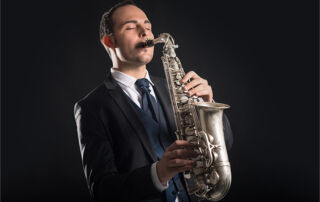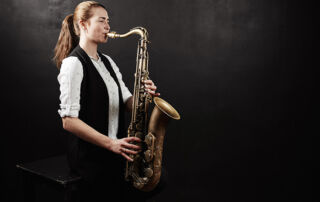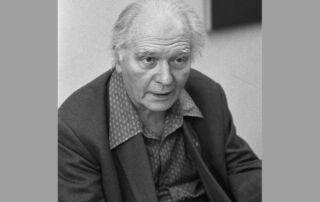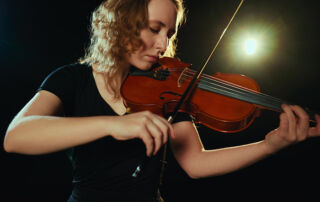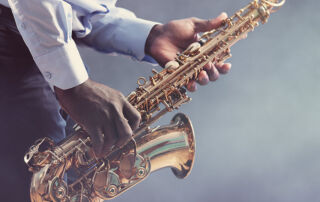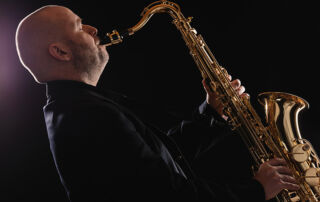
Anner Bylsma
Anner Bylsma, stage name of Anne Bijlsma, born in 1934 in The Hague, is both a performer of modern repertoire and baroque repertoire on period instruments.
Since the feminine name Anne caused confusion, he later adopted the name Anner. He received his first music lessons from his father, a violinist, trombonist, conductor, and composer.
He studied at the Royal Conservatory of The Hague, where he explored the art of baroque cello and won the First Prize at the Pablo Casals International Competition in Mexico in 1959.
From 1962 to 1968, he served as the principal cellist of the Concertgebouw Orchestra in Amsterdam.
From the 1960s onwards, Anner Bylsma focused on music from the 17th and 18th centuries, placing particular importance on performance using period instruments.
He met Gustav Leonhardt and Frans Brüggen.
Both musicians were already well-known and had a network of musicians who shared their artistic vision. From 1968, their collaboration led to the creation of an extensive discography.
Anner Bylsma meurt en 2019 à Amsterdam.

Photo: "János Starker, renowned cellist and teacher, leading a master class, Temple University, April 6, 2009" by David Webber. Sous licence CC BY-SA 2.0.
Janos Starker
Born in Budapest, Hungary, in 1924, János Starker began playing the cello at the age of six. After studying at the Franz Liszt Academy. He joined the Budapest Philharmonic Orchestra and the Opera Orchestra of the Hungarian capital, where he held the position of principal cellist.
Although he escaped forced labour and death due to his young age when the Second World War broke out, the Jewish musician was deported to a concentration camp, where he was imprisoned for three months. The cellist left Europe in 1948 to settle in the United States.
A member of the Dallas Symphony Orchestra, he later collaborated regularly with the Metropolitan Opera Orchestra in New York and the Chicago Symphony Orchestra.
In 1958, János Starker established the position of cello professor at the Jacobs School of Music at Indiana University in Bloomington.
The musician, renowned for his recordings of Kodály (Cello Sonata Op. 8), Dvořák (Cello Concerto), and J. S. Bach, divided his time between teaching, giving masterclasses around the world, touring, and recording.
János Starker passed away in 2013 at the age of 88.

Photo : « Pablo Casals » par Bain News Service. Sous licence Domaine public.
Pablo Casals
Born in El Vendrell, south of Barcelona, in 1876, he studied cello at the Barcelona Conservatory.
In 1890, he gave his first public concert and discovered Bach's Six Cello Suites, which he would later bring to widespread public attention.
Isaac Albéniz met him in a café where he was playing to earn a living and introduced him to Queen Maria Christina, who arranged for him to enter the Madrid Conservatory in 1894.
After a stay in Brussels and Paris, he returned to Barcelona, formed a quartet, and worked at the Liceu from 1897 to 1899.
In 1905, he founded the Cortot-Thibaud-Casals Trio.
In 1919, upon returning to Catalonia, he established the Pau Casals Orchestra.
He organised concerts for the less privileged. A staunch supporter of the Spanish Republic, he refused to perform in Nazi Germany.
After the Spanish Civil War, he went into exile in Prades, where he lived for many years and composed the oratorio *El Pessebre*.
He helped his compatriots and, in 1945, decided to stop performing in public to protest against the leniency of Western democracies towards the Franco regime.
The bicentenary of Bach's death led him to resume playing and to establish the Prades Festival, in which he participated for the last time in 1966, before moving to Puerto Rico, the homeland of his mother and his last wife, Martita, where he passed away in 1973.

Photo : « Le violoncelliste Mstislav Rostropovitch, se produisant à la Maison-Blanche le 17 septembre 1978 » par White House Staff Photographers. Sous licence Domaine public.
Mstilslav Rostropovitch
Mstislav Leopoldovitch Rostropovitch, born in 1927 in Baku (Azerbaijan SSR, USSR), became known as a champion of freedom.
Mstislav Rostropovich was born in Baku (Azerbaijan) to a Russian mother and a father of Polish-Belarusian nobility. From the age of 4, he learned piano from his mother and cello from his father.
At the age of sixteen, he entered the Moscow Conservatory, where he studied piano, cello, as well as conducting and composition.
He won the First Prize at the international competitions in Prague and Budapest in 1947, 1949, and 1950. He taught at the Leningrad Conservatory (now Saint Petersburg) and later at the Moscow Conservatory.
His international career began in 1963 at the Liège Conservatory and in 1964 with a concert in West Germany.
From then on, he undertook several tours, meeting composers such as Benjamin Britten, who began composing for him. In 1967, he conducted *Eugene Onegin* at the Bolshoi, revealing his passion for conducting and opera.
His friendship with Alexander Solzhenitsyn and his support for opponents of the regime led to his official disgrace in the early 1970s.
He was excluded from numerous musical groups, prompting Rostropovich to leave the Soviet Union and settle in the United States.
In 1978, he was officially stripped of his Soviet citizenship by Leonid Brezhnev for "acts systematically damaging to the prestige of the Soviet Union."
He then became stateless.
From 1977 to 1994, he served as the conductor of the National Symphony Orchestra in Washington.
He was also the director and founder of numerous festivals, gave many recitals and concerts, and performed with some of the greatest musicians.
He also inspired numerous compositions by Shostakovich, Prokofiev, Britten, Dutilleux, Bernstein, and Penderecki.
He passed away in Moscow in 2007, one month after celebrating his 80th birthday.

Photo : « Gregor Piatigorsky en 1945 » par Inconnu. Sous licence Domaine public.
Gregor Piatigorsky
Gregor Piatigorsky, born in Ekaterinoslav (now Dnipro), Ukraine, in 1903. He began playing the cello at the age of seven, entered the Moscow Conservatory at nine, and immediately embarked on his first tours in Russia.
In 1919, he was appointed principal cellist of the Bolshoi Orchestra and joined the Lenin Quartet in Moscow.
The musician fled the USSR in 1921 and went to Berlin and Leipzig.
In 1924, Wilhelm Furtwängler appointed him as principal cellist of the Berlin Philharmonic Orchestra.
In 1929, he left his position at the Berlin Philharmonic Orchestra to begin an international solo career, first in Europe and later in the United States.
He settled in the United States in 1939 and became a naturalised citizen in 1942.
He taught cello at the Curtis Institute of Music in Philadelphia (1942–1951), Boston University (1957–1962), and the University of Southern California in Los Angeles.
Gregor Piatigorsky passed away in Los Angeles on 6 August 1976.

